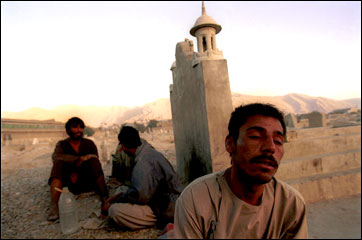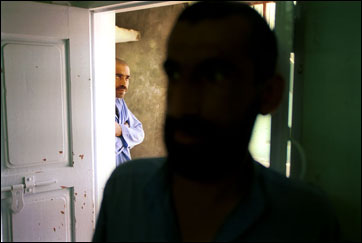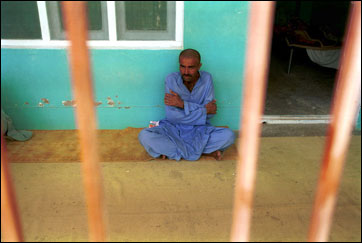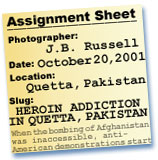|
Heroin Addiction in
Quetta
By J.B. Russell
Photojournalist
Quetta, Pakistan.
20 October 2001
When the bombing of Afghanistan
was inaccessible, anti-American demonstrations started getting repetitive
and closed borders prevented refugees fleeing the conflict from entering
Pakistan, what does a photojournalist do? Drugs of course.
Afghanistan is by far the largest producer of opium poppies, the raw
material for the fabrication of heroin, growing some 70% of the world's
supply. For years this illicit crop and its by products have
helped finance the violence in Afghanistan. Despite being officially
banned by the Taliban, it provided desperately needed cash to the
regime as well as to an impoverished population with virtually no
economy. We hear a great deal about the war on drugs and the
devastation that drug addiction wreaks on western societies - the
primary market for narcotics consumption. However the human
and social ills that are the consequence of heroin use are not limited
to the West.
The countries that are on the doorstep of Afghanistan and that act
as production and transit points for the global heroin trade are also
the victims of heroin use themselves. Quetta is no exception.
Many of the hundreds of street addicts in Quetta are Afghan
refugees, veterans of the region’s seemingly endless conflicts
and victims of the resulting poverty. They fall into the downward
spiral of drug use as their only means of escape from their abject
existence. Others are Pakistani that use drugs for some of the
same reasons, while some are educated with jobs and families but nevertheless
lose everything to the drug.
Most of the addicts of Quetta live and consume in the underpasses
of the city's sewage canals where the living and sanitary conditions
are deplorable. Others live in tombs and caves of one of the
city's cemeteries. There are a few associations that attempt
to help the addicts directly and by disseminating information to reduce
the risk of diseases associated with drug use, but these organizations
receive very little funding from the government or private donors.
While some services are free, most require the addicts or their
families to pay a small monthly fee. This makes the treatment
beyond the means of the vast majority of the addicts.
J.B. Russell
Photojournalist
9, rue Feutrier
75018 Paris, FRANCE
tel/fax:+33 1 46 06 48 59
mobile: +33 6 07 94 22 64
RoadtoNowhere@compuserve.co
|

© Photo/J.B. Russell 2001 |

© Photo/J.B. Russell 2001 |

© Photo/J.B. Russell 2001 |

© Photo/J.B. Russell 2001 |

© Photo/J.B. Russell 2001 |

© Photo/J.B. Russell 2001 |
|







